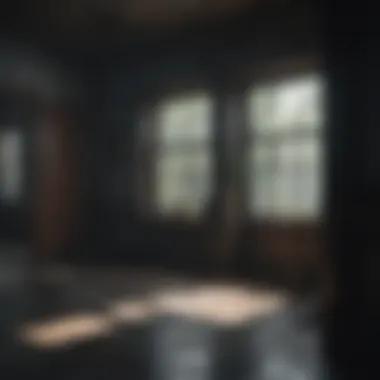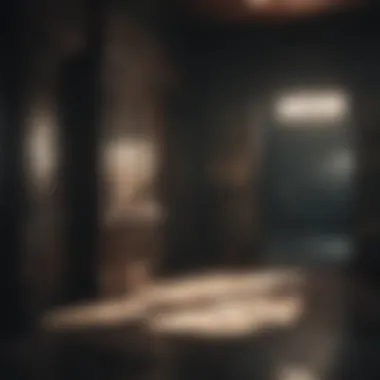Unveiling the Rich Tapestry of Resident Evil: An In-Depth Exploration


In delving into the extensive realm of Resident Evil, one must first grasp the intricate evolution and impact this iconic franchise has wielded in the gaming sphere. From its humble beginnings to its contemporary adaptations, Resident Evil has solidified its stance as a cornerstone of the survival horror genre, captivating players worldwide.
PlotStoryline Analysis
Analyzing the plot and storyline of Resident Evil unveils a narrative woven with tension, suspense, and the ever-present threat of biohazards. The franchise intricately crafts tales of survival amid apocalyptic scenarios, involving intricate puzzles, sinister corporations, and grotesque mutations, each element intertwining to imm ensely enrich the player's experience without divulging crucial spoilers.
Character Development
Delving into the world of Resident Evil necessitates a closer look at the main characters who navigate its treacherous landscapes. From the resilient protagonists like Chris Redfield and Jill Valentine to formidable antagonists such as Albert Wesker and Nemesis, each character undergoes arcs of growth, despair, and resilience, shaping the overarching narrative and leaving an indelible mark on the franchise's legacy.
Visuals and Effects
Resident Evil's visual and effects are pivotal in engrossing players within its nightmarish world. The intricate detailing of eerie environments, grotesque creatures, and spine-chilling sound design heightens the immersion, creating an ambiance that oscillates between palpable dread and fleeting hope. The franchise's commitment to visual excellence and atmospheric effects complements its gameplay dynamics, ensuring a spine-tingling experience for gamers and enthusiasts alike.
Introduction
In the labyrinthine realm of video games, few franchises loom as large and ominous as Resident Evil. This comprehensive analysis traverses the tangled history, evolutionary leaps, and lasting impacts of the iconic series. Dive into the shadows cast by this behemoth in the gaming landscape, as we unravel the threads that make Resident Evil a pivotal force in interactive entertainment.
Brief History of Resident Evil
Origins and Inspiration
Embark on a journey to uncover the origins and inspirations that birthed the Resident Evil universe. Rooted in the dark recesses of survival horror lore, the genesis of Resident Evil drew sustenance from the tendrils of gothic literature, apocalyptic visions, and the macabre essence of urban legends. A tapestry woven with threads of fear and mystique, the franchise's inception paints a vivid picture of dread and intrigue, setting the stage for unparalleled storytelling in the gaming sphere. The deliberate interplay of tension, narrative depth, and fear-inducing atmospheres nurtured a breeding ground for terror unseen in the gaming realm, catapulting Resident Evil into the pantheon of horror legends.
Release of the First Game
The reverberations caused by the release of the inaugural Resident Evil game rippled through the gaming industry like a seismic wave. With the unveiling of this monumental title, a paradigm shift ensued, redefining the landscape of interactive horror experiences. Garnering acclaim for its pioneering gameplay mechanics, atmospheric design, and unforgettable encounters, the first Resident Evil game etched itself indelibly into the annals of gaming history. Through a masterful blend of suspenseful exploration, heart-thumping survival mechanics, and spine-chilling encounters, this landmark release guided gamers into uncharted territories of fear and adrenaline, setting a precedent for horror games that echoed for decades to come.
Evolution of Gameplay
Tank Controls and Fixed Camera Angles


Venture back to the era when tank controls and fixed camera angles ruled the gaming domain. A testament to the ingenuity of game design at the time, these unconventional mechanics not only heightened the sense of vulnerability and immersion but also instilled a palpable feeling of dread in players. The deliberate restriction of movement, coupled with obscured viewpoints, served as catalysts for tension and anxiety, crafting an experience where the unknown lurked around every corner. While these mechanics may feel archaic by modern standards, their influence on shaping player experience and genre conventions remains undeniable.
Shift to Action-Oriented Gameplay
Witness the metamorphosis of Resident Evil as it transitioned from its atmospheric, horror-centric roots to embrace an action-oriented gameplay approach. This evolutionary leap, while divisive among purists, injected a new vitality into the franchise, propelling it to even greater heights of commercial success and critical acclaim. Embracing a more dynamic playstyle, replete with intense action sequences, explosive set pieces, and adrenaline-pumping combat, this shift redefined the series' identity, broadening its appeal to a wider spectrum of gamers. Despite straying from its horror-laden origins, this transformation brought with it a fresh perspective that revitalized the franchise and ensured its continued relevance in the ever-changing landscape of gaming.
Character Analysis
Character analysis plays a pivotal role in dissecting the intricate world of the iconic franchise, Resident Evil. By delving into the core attributes and roles of both protagonists and antagonists, this section sheds light on the significance of character development in shaping the immersive experience of the game.
Protagonists
Chris Redfield
Chris Redfield stands as a stalwart figure in the Resident Evil series, known for his unwavering resolve and leadership qualities. His resilience in the face of relentless horrors and his dedication to upholding justice make him a compelling protagonist for this analysis. His military background and tactical prowess bring a sense of grounded reality to the narrative, offering players a relatable anchor amid the chaos of the game world. However, some critique his portrayal as lacking in complexity compared to other characters.
Jill Valentine
Jill Valentine emerges as a resilient and resourceful protagonist, excelling in survival situations with her sharp wit and exceptional combat skills. Her role as a master of unlocking and her strategic mindset make her a popular choice for players seeking a balanced gameplay experience. Jill's character arc, from her early appearances to her later feats of heroism, showcases her evolution as a multifaceted character. Critics note her tendency to be stereotyped as the 'damsel in distress' in certain scenarios.
Claire Redfield
Claire Redfield brings a sense of empathy and compassion to the Resident Evil universe, balancing her fierce determination with a nurturing instinct towards those in need. Her bond with her brother, Chris Redfield, adds emotional depth to her character, making her journey intertwined with themes of family and survival. Claire's adaptability and quick thinking complement her character, offering players a refreshing perspective on resilience in times of crisis. However, her characterization at times leans towards predictability, lacking the complexity seen in other protagonists.
Antagonists
Albert Wesker
Albert Wesker embodies the epitome of cunning and manipulation, serving as a formidable adversary in the Resident Evil series. His calculated schemes and enigmatic persona establish him as a compelling antagonist, keeping players on edge with his mysterious motives. Wesker's legacy of betrayal and ambition adds layers of intrigue to the game's narrative, making him a memorable villain. However, some critique his characterization as veering into stereotypical 'evil genius' tropes.
Nemesis
Nemesis emerges as a relentless force of terror, designed to instill fear and chaos in players through its relentless pursuit. Its imposing presence and adaptive abilities create intense moments of tension, adding a survival horror element that sets it apart from standard antagonists. Nemesis' role as a nemesis to the protagonists elevates the stakes of the game, offering players a formidable challenge to overcome. Some view Nemesis as somewhat one-dimensional in its relentless pursuit, lacking the depth seen in more nuanced antagonists.


Alex Wesker
Alex Wesker brings a unique twist to the roster of antagonists in Resident Evil, with a focus on psychological manipulation and testing the limits of morality. Her enigmatic presence and morally ambiguous actions add a cerebral element to the game's narrative, challenging players to confront ethical dilemmas amidst the horror. Alex's penchant for psychological warfare and intricate schemes make her a compelling foe for the protagonists. However, her character development is at times overshadowed by other central antagonists, leading to a comparative lack of exploration into her motivations and backstory.
Influence on Survival Horror Genre
Pioneering Gameplay Mechanics
Inventory Management
Inventory Management stands out as a fundamental aspect of the Resident Evil gameplay experience, adding a layer of strategic decision-making for players. This mechanic requires meticulous planning and prioritization of items, as each choice influences the player's progression and survival within the game world. The limited inventory space induces a sense of tension and urgency, mirroring the thematic elements of survival and resource management prevalent in the franchise. While demanding in its implementation, Inventory Management elevates the immersion and challenge of gameplay, fostering a deeper connection between players and their in-game avatars.
Resource Scarcity
Resource Scarcity serves as another cornerstone of the Resident Evil series, amplifying the horror elements by imposing restrictions on ammunition, healing items, and other vital resources. This deliberate scarcity forces players to adopt a cautious and measured approach to encounters, emphasizing conservation and strategic resource allocation. The constant sense of vulnerability cultivated by scarcity enhances the overall suspense and fear-inducing ambiance of the games, aligning perfectly with the survival horror genre's core principles. Despite presenting formidable challenges, Resource Scarcity intensifies the gameplay experience, encouraging players to adapt and persevere in the face of adversity.
Impact on Subsequent Titles
Resident Evil 4: The Shift to Action
'Resident Evil 4: The Shift to Action' marked a significant departure from the franchise's traditional survival horror roots, introducing an innovative blend of action-oriented gameplay elements. The game's over-the-shoulder perspective, dynamic combat mechanics, and intensified pace redefined the third-person shooter genre, influencing numerous titles that followed. While polarizing among fans for its divergent approach, Resident Evil 4 reshaped player expectations and established new standards for immersive, high-octane gaming experiences.
Resident Evil 7: Return to Horror Roots
In contrast, 'Resident Evil 7: Return to Horror Roots' signaled a thematic and tonal resurgence towards the franchise's atmospheric horror origins, embracing a first-person viewpoint and emphasizing psychological terror. By prioritizing tension-building narratives, innovative VR integration, and a back-to-basics survival ethos, Resident Evil 7 reinvigorated the series with a fresh sense of dread and unease. The game's return to intimate, dread-inducing environments reinforced Resident Evil's legacy as a genre-defining force, showcasing the enduring appeal of classic survival horror tropes in a modern gaming landscape.
Cinematic Adaptations
In the realm of video game adaptations to the silver screen, the topic of Cinematic Adaptations holds significant relevance within the context of this article on Resident Evil. Exploring how the game's intricate storylines, characters, and gameplay mechanics transition to a visual medium adds a layer of complexity and excitement for fans and newcomers alike. Cinematic Adaptations offer a bridge between the interactive gaming experience and passive cinematic viewing, broadening the franchise's reach and impact.
Resident Evil Movies


Exploration of Alice's Character
The Exploration of Alice's Character in the Resident Evil movies plays a crucial role in diversifying the narrative landscape of the franchise. By introducing a unique protagonist not heavily featured in the games, the movies carve out a distinctive identity, appealing to both loyal fans and general audiences. Alice's evolution throughout the films showcases her resilience, depth, and growth, allowing viewers to connect with a new perspective within the Resident Evil universe.
Divergence from Game Plotlines
Diverging from the intricate plotlines of the video games, the Resident Evil movies pave a new path that adds a refreshing twist to familiar story arcs. While some purists may critique the deviations from the source material, the creative divergence opens doors to imaginative storytelling possibilities. It offers filmmakers the creative freedom to explore new narratives, character dynamics, and visual spectacles, enriching the cinematic experience for viewers.
Upcoming Reboot
In anticipation of the upcoming Resident Evil reboot, the focus on retelling the Initial Mansion Incident signifies a return to the roots of the franchise. By revisiting where it all began, the reboot aims to honor the essence of the original game while injecting fresh perspectives and modern cinematic trends. This deliberate choice not only pays homage to the iconic moments that shaped Resident Evil but also sets the stage for a renewed storytelling approach that balances nostalgia with innovation.
Emphasis on Horror Elements
Emphasizing horror elements in the upcoming reboot signals a strategic shift back to the franchise's survival horror roots. By prioritizing fear, tension, and psychological thrills, the new adaptation aims to reignite the chilling atmosphere that defined early Resident Evil titles. This deliberate choice to embrace horror not only appeals to long-time fans seeking a return to form but also attracts new audiences looking for a riveting and immersive cinematic experience.
Fan Community and Legacy
Resident Evil's Fan Community and Legacy play a vital role in understanding the franchise's enduring impact on popular culture. The dedicated followers of Resident Evil have cultivated a vibrant community that extends beyond the game's narrative. Through various mediums like cosplay, fan art, and streaming, fans express their appreciation for the series, fostering a sense of camaraderie and creativity. This section will delve into the significance of the fan community and how it has contributed to the overall legacy of Resident Evil that transcends traditional gaming boundaries.
Dedicated Fanbase
Cosplay and Fan Art
Cosplay and fan art are integral aspects of the Resident Evil fan community, serving as creative outlets for enthusiasts to showcase their admiration for the franchise. The meticulous attention to detail in replicating character costumes and crafting fan art speaks to the passion and dedication of fans. By embodying their favorite characters through cosplay and producing original artwork, fans pay homage to Resident Evil's rich lore, sparking conversations and engagement within the community. While cosplay and fan art provide avenues for self-expression and artistic exploration, they also serve as tangible manifestations of the enduring love fans have for the series.
Streaming Culture
Streaming culture has revolutionized the way fans interact with gaming content, including Resident Evil. Platforms like Twitch and You Tube offer players the opportunity to share their gameplay experiences, strategies, and reactions in real-time with a global audience. For Resident Evil enthusiasts, streaming provides a platform to discuss their favorite aspects of the games, analyze gameplay mechanics, and connect with like-minded individuals. The live and interactive nature of streams enhances viewer engagement, making it a popular choice for fans looking to immerse themselves further in the Resident Evil universe, creating a sense of community and shared enthusiasm.
Enduring Impact
Resident Evil in Popular Culture
The influence of Resident Evil extends far beyond the gaming sphere, permeating popular culture in various forms. From references in movies and TV shows to merchandise collaborations and theme park attractions, Resident Evil has cemented its place in the entertainment landscape. The franchise's iconic characters, compelling narratives, and innovative gameplay mechanics have left a lasting imprint on audiences worldwide, shaping the survival horror genre and inspiring diverse adaptations across different media platforms. This section will explore how Resident Evil's presence in popular culture reflects its enduring impact and ongoing relevance in the creative landscape.
Merchandise and Spin-Offs
Merchandise and spin-offs are emblematic of the widespread appeal of Resident Evil, offering fans an opportunity to engage with the series beyond the realm of gaming. From action figures and clothing lines to novels and animated films, Resident Evil merchandise caters to a diverse fan base eager to immerse themselves in the franchise's universe. Spin-off games and expanded canon further enrich the Resident Evil experience, introducing new storytelling avenues and gameplay mechanics that complement the core franchise. While merchandise and spin-offs provide fans with additional content to explore, they also act as extensions of the main series, capitalizing on the franchise's popularity and cultivating a dynamic ecosystem of interconnected narratives and products.













